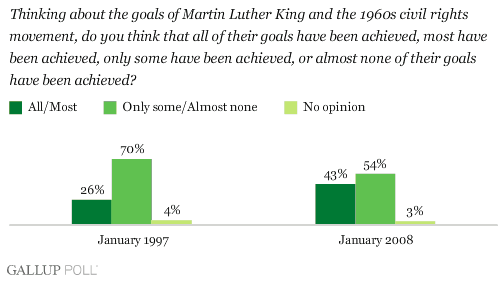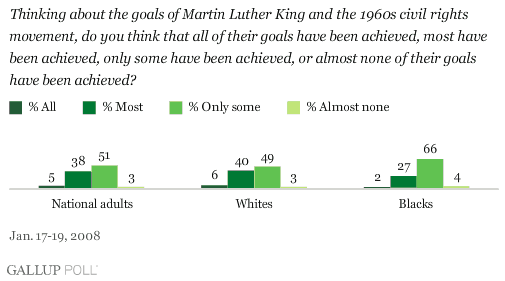PRINCETON, NJ -- On this 23rd celebration of the Martin Luther King Jr. holiday, new Gallup polling finds most Americans hesitant to say the goals of King and the 1960s civil rights movement, more broadly, have been achieved. Just 43% say all or most of the goals have been achieved while 51% say only some of the goals have been achieved; another 3% say almost none have.
Still, perceptions of progress on civil rights are more positive today than they were a decade ago. In January 1997, only 26% of Americans were generally upbeat, saying all or most of the goals of King and the 1960s civil rights movement had been met, while 70% were more cautious.

In the current poll, conducted Jan. 17-19, 2008, whites are much more positive than blacks about the success of the movement. Whites are about evenly divided between those saying all or most of the goals have been achieved (46%) and those saying only some or almost none of the goals have been achieved (52%). By contrast, only 29% of blacks say all or most of the goals have been achieved, while 70% say only some or almost none have.

From other Gallup data, it appears Americans want to see continued progress on the goals of King and his 1960s civil rights compatriots. Public attitudes about the civil rights movement have been mostly positive in recent years. In April 2000, Gallup found nearly half of Americans (49%) saying they "strongly agree" with the goals of the civil rights movement, and another 37% saying they "somewhat agree." Only 12% disagreed to any degree.
A December 1999 Gallup Poll of U.S. national adults found King to be tied with John F. Kennedy and Albert Einstein as one of the most admired people to have lived in the 20th century, second only to Mother Teresa. Two-thirds of Americans said King was the person they "most admired" or admired from that century, while another 22% said they somewhat admired him. Only 10% said they did not admire him.
King edged out such world leaders as Franklin Delano Roosevelt, Pope John Paul II, and Winston Churchill in the 1999 ratings, and far outranked two other pacifist icons: Nelson Mandela and Mahatma Gandhi.
As evidenced by these findings, public respect for King's life and work is so prevalent in the United States today that Americans' rejection of King and his political methods some 50 years ago may be hard to conceive of, especially for modern-day schoolchildren enjoying a day off in his honor.
In August 1963, Gallup found considerable public opposition to the now-famous civil rights march on Washington in which King delivered his "I Have a Dream" speech. The poll was conducted about two weeks before the march, at which time 71% were familiar with "the proposed mass civil rights rally to be held in Washington, D.C., on Aug. 28." Of those who were familiar, only 23% said they had a favorable view of "the rally"; 42% had an unfavorable view of it (including 7% who predicted violence would occur) and 18% said it wouldn't accomplish anything.
In May 1964, Gallup asked, "Do you think mass demonstrations by Negroes are more likely to help or more likely to hurt the Negro's cause for racial equality?" In response, only 16% of Americans -- including just 10% of whites but 55% of nonwhites -- said such mass demonstrations would help the cause.
Gallup Polls chronicling public attitudes toward King, personally, start with a May 1963 survey, conducted one month after King penned his open "Letter From Birmingham Jail," in which he argued that "one has a moral responsibility to disobey unjust laws." In that survey, Gallup found nearly as many Americans holding an unfavorable view of King (37%) as held a favorable view (41%).
In August 1964, a year after King's "I Have a Dream" speech at the March on Washington for Jobs and Freedom, and a month after President Lyndon Johnson signed the 1964 Civil Rights Act into law, the picture was not much different: 44% of Americans had a favorable view of King and 38% an unfavorable view.
Between August 1964 and Gallup's next favorability measure on King, in May 1965, King won the Nobel Peace Prize for his nonviolent efforts to end segregation and racial discrimination. However, in that May 1965 poll, public opinion of King was even more negative than it had previously been: 45% of Americans had a favorable view of him and 46% an unfavorable view.
In 1965, King began to speak out against the Vietnam War, and in 1966, he and his family moved from the South to the slums of Chicago, where he joined other black leaders in agitating for an end to housing and employment discrimination, among other reforms. An August 1966 poll found public attitudes toward King the most negative to date: 33% favorable, 63% unfavorable.
King was assassinated on April 4, 1968, standing on the balcony outside his room at the Lorraine Motel in Memphis, Tenn. On Jan. 20, 1986, the United States observed the first Martin Luther King Jr. holiday.
About a year later, an April 1987 Gallup Poll found three-quarters of Americans expressing a "very favorable" or "mostly favorable" view of King; only 20% said they had a mostly unfavorable or very unfavorable view of him.
Survey Methods
The latest results are based on telephone interviews with 3,082 national adults, aged 18 and older, conducted Jan. 17-19, 2008. For results based on the total sample of national adults, one can say with 95% confidence that the maximum margin of sampling error is ±2 percentage points. Results based on the sample of 2,628 whites have a maximum margin of sampling error of ±2 percentage points. Results based on the sample of 204 blacks have a maximum margin of sampling error of ±8 percentage points.
In addition to sampling error, question wording and practical difficulties in conducting surveys can introduce error or bias into the findings of public opinion polls.
